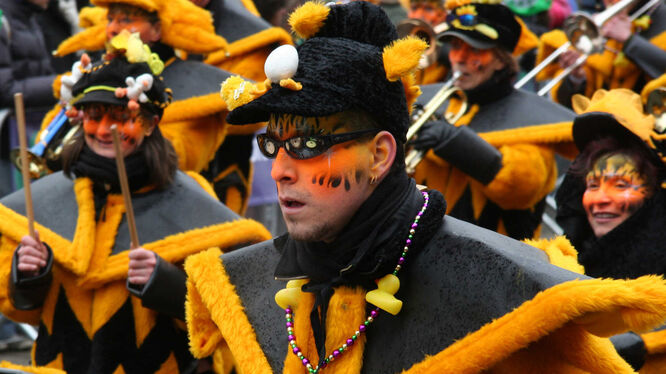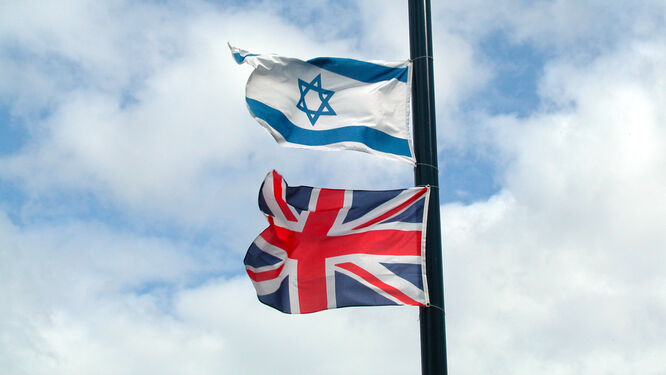Northern Ireland Thoughts: Smiles or Sinister?
By Rick Steves
Sept 10, 2003
After a week filming in Northern Ireland I came away with mixed feelings. Its rich history and beautiful landscape make it enjoyable to visit. Safety for travelers is not an issue — every American I met traveling in the North was at ease and statistically it's as safe as any other country. But the casual visitor can be oblivious to the stress and hate that underlies this unfortunate corner of Europe. Traveling with local guide Stephen McPhilemy (who leads Ireland tours for my company), I learned more than many would want to know. Being Catholic, he gave things the slant any kid who grew up wearing green in the North would. And there's no real alternative to being on one side or the other. Even today, when you apply for a job in the North you must associate yourself with either the Catholic or the Protestant community. But all reasonable people made it clear to me that it is the extremists on both sides who perpetuate the violence and that religious labels are misleading as the bickering isn't over religion but politics: should the North be governed by London or Dublin?
A bomb scare was announced on the radio on the day we were in Belfast. Stephen explained that most bomb threats are bogus and ignored by the police. Police knew to take this one seriously because each violent organization has a code word used in communication with the police to authenticate a bomb threat. The threat passed.
At the tomb of the eight Catholics who starved themselves to death in 1981 for the cause of the Irish Republic, Stephen explained that, when it comes to hunger striking, the IRA has a moral advantage over Protestant militant groups which have never had a serious hunger strike. While Catholics have effectively used hunger strikes for 150 years as a powerful weapon (creating many martyrs), Protestants tried only one hunger strike. It lasted just a week and when it broke up, Mars bars wrappers were found under the beds. Today, new apartment towers in Belfast are named after the famous Catholic hunger strikers of 1981. The rooftops fly huge Irish flags and sport giant portraits of these Irish heroes for all of Belfast to see and remember.
Falls Road leads into Belfast's most famous Catholic sectarian neighborhood. Behind a police station that looms above the road like an iron fortress is a unique pub. The Felon's Club is limited to people who've spent at least a year in prison for political crimes (and a few fast-talking travel journalists and guides). Inside, it's a men-only scene and the walls are festooned with photos and souvenirs of the long struggle to unite Ireland. To get here, you don't tell the cabbie exactly where you're going. The people of Northern Ireland live wary lives. Guides and cabbies who've worked together for years still don't reveal their family names to each other.
Bushmills — a small town on the north coast much visited for its famous whiskey distillery tours — has a sinister feel. Still reeling from an overdose of support-the-war flag-waving in my own hometown, I found Bushmills a patriotic nightmare: curbs were painted red, white and blue, and the Union Jack was lashed to each telephone pole, giving the town the air of a weary and obligatory patriotism. This is known as Ulster's Bible Belt: nearly everyone here is Protestant. Children solicit donations for Unionist causes, awarding each donor with a lapel sticker. If you're not wearing the sticker, it's tough to find a smile. (Actually, it was tough to find a smile anyway.) While houses here were decked out like flag-waving temples of patriotism, in sectarian Catholic neighborhoods the Irish colors flew just as angrily. The sad result of Protestants using their flag as a logo for their cause is that a third of the population is offended by it — with many Catholics calling the country's red, white and blue Union Jack "the butcher's apron."

Ulster's Protestants are the descendants of settlers encouraged to move (or "planted") here centuries ago by a Britain trying to consolidate its hold on Ireland. These are the Scots Irish — the dominant ethnic group in the North.
There's a strange sister ethnic group thing going on in the North. Catholic neighborhoods celebrate minority causes such as the Basques, Palistinians and the Turkish Kurds. In fact, a disproportionate percentage of tourists you see in the North are from groups caught up in ethnic strife. I saw a steady trickle of Basques — touring the Catholic neighborhood for inspiration and enjoying political murals that celebrated their cause along with Ireland's. And Protestant towns actually fly the Israeli flag (in solidarity with another group of embattled settlers planted more recently).
Newspapers announced new statistics, saying that violence in 2003 — measured in petrol bombs thrown and policemen injured — was way down. Still, throughout marching season (Easter through September) several thousand "Orange parades" fill village and neighborhood streets with Protestants "beating the pope" with their angry drums. Ninety percent of these march through Protestant towns and are peaceful. But those that visit Catholic areas are intentionally antagonistic and can be dangerous.
Stumbling onto a parade, I asked the police, primed to enforce the peace, what was going on. They said it was an Orange kids' parade...and compared the kids to Nazi Youth. The most poignant sight I saw all summer was at this parade. Dads — draped in ribbons and military-style medallions — marched with their sons, passing on their passions. Preschoolers waved flags, oblivious to what they stood for. The grade schoolers — a few years older and clearly more tuned in to the situation — already scowled and twirled their batons ferociously. The tourist board is trying to make these parades "festive expressions of the local culture." But sitting curbside at an Orange parade, all this Lutheran wanted to do was hug a Catholic.
In response to the recent popularity of the old Irish language, the Ulster Protestants are claiming they also have a language of their own. I desperately wanted a soundbite of this for our TV show. But we found no one who could actually speak the Scots Irish. In Bushmills, the president of the local Scots Irish group admitted he didn't speak it but motioned to the "Royal" pub and said, "after a couple a jars, I'll speak ye some Scots Irish." There's one old guy up here — famous locally as a wannabe ethnic group of one — who reputedly speaks the dialect. But we never found him.

